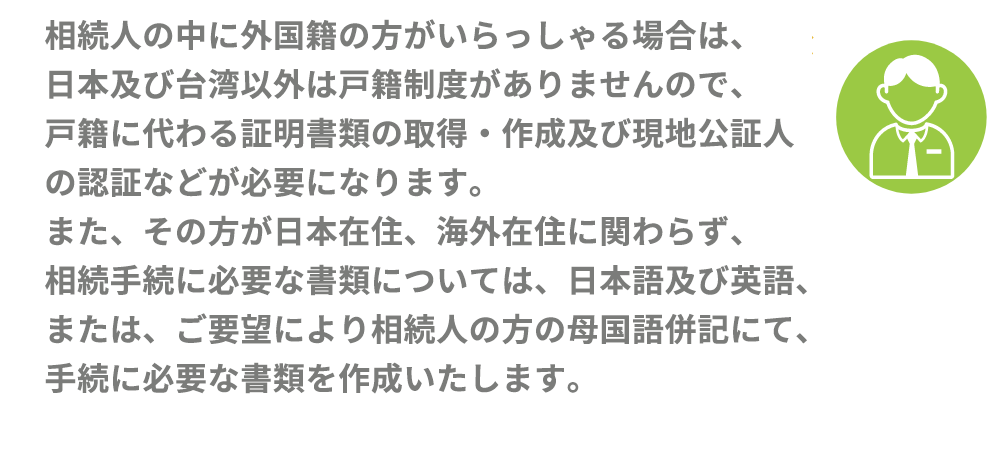TOPへ
海外関連相続
海外関連相続
Overseas inheritance


渉外登記とは
定義は明確ではありませんが、外国籍の方や在外邦人などが関与する登記手続きのことで、以下のようなケースが含まれます。
渉外相続登記
被相続人(亡くなられた方)又は相続人のいずれかに外国人がいる場合や、被相続人の居住地、死亡した場所、相続財産の所在地、相続人の居住地のいずれかが外国であるとき。
渉外不動産登記
外国籍の方が日本の不動産を購入するとき。
渉外商業登記
外国籍の方が出資される会社設立や役員に就任されるとき。
よくある質問
Questions
Q1 日本に不動産を持っているアメリカ国籍の父が亡くなりました。父は、晩年アメリカに戻り母と二人で暮らしておりました。アメリカには戸籍制度がないと聞きましたが、不動産の相続手続きに必要とされている戸籍が入手できない場合はどうしたらよいのでしょうか。

Q2 配偶者の遺産を整理していたところ、ハワイの銀行に預金があることがわかりました。どのように手続きすればよいでしょうか。

English
About
Shiho-shoshi (Shiho-shoshi lawyer)
As specialists in registration procedures about real estate and juridical persons, Shiho-shoshi have contributed to the development of the economic society and the protection of citizens’ rights.
According to the amendment of the Shiho-shoshi Act of 2002, Shiho-shoshi, certified by the Ministry of Justice, are granted the authority to represent clients in suits brought before courts of summary jurisdiction.
At present, more than 70% of Shiho-shoshi have been certified by the Ministry of Justice and act as agents for suits in civil cases that concern matters up to ¥1.4 million.
Shiho-shoshi may also have responsibilities to settle and provide consultation for various legal problems that might occur in everyday life, such as preparing documents to be submitted to courts, supporting “pro se” suits, holding extra-judicial settlement talks and acting as arbitrators in disputes.
****************************************
-
Agents for immovable property registration
As specialists in registration procedures about real estate and juridical persons, Shiho-shoshi have contributed to the development of the economic society and the protection of citizens’ rights.
Immovable property
registration is a Japanese system in which information concerning land and buildings (such as owner, area, existence or nonexistence of collateral) is described in the “registration records” managed by the Legal Affairs Bureau and publicly available, in order to promote confidence in the safety of real estate transactions.
Shiho-shoshi act as agents for undertaking the procedures for registration concerning rights to real estate, such as a change of name or title by sale and purchase, donations, inheritance of real estate and registration of mortgages and lease-holdings.
Shiho-shoshi will assume the responsibility of making applications for immovable property registration in Japan and contribute to the protection of citizens’ rights, by checks of people, material items and contractual intentions, so as to protect all parties’ rights concerning real estate transactions. -
Agents for commercial registration
In Japan, juridical persons such as companies are obliged to describe all matters stipulated in the Companies Act and other laws in the “registration records” managed by the Legal Affairs Bureau.
Corporate registration plays an important role when changing board members, company names or objectives and developing companies by corporate reorganization through capital increase, mergers or corporate separations and other such matters.
Shiho-shoshi act as agents for such juridical persons in making applications for registration and contribute to the safety of transactions, as specialists in commercial registration. -
Guardianship of adults
For those who have insufficient judgment capabilities, due to dementia, intellectual disabilities, or similar problems and find it difficult to manage their own real and personal property, there is an “adult guardianship” system in Japan, in which the family court appoints a “guardian of an adult” who is charged with protecting the individual’s assets.
To support this “adult guardianship” system, Shiho-shoshi established the Legal-Support Adult Guardian Center as an incorporated association (currently public-interest incorporated association) in December 1999. At present, more than 30%* of Shiho-shoshi belong to the center and are assiduously carrying out the necessary activities to protect the rights of elderly and disabled persons using this system.
When a third party, other than a relative is selected as a guardian, family courts usually select Shiho-shoshi. (*as of June 2014). -
Lawsuits before a court
There are venues called “summary courts” across Japan, that handle mainly those problems that are familiar to average people.
There are also many Shiho-shoshi, who are authorized by the Ministry of Justice (known as ‘certified’ Shiho-shoshi) all over the country and who act as agents in civil suits and mediation that handle cases up to ¥1.4 million in such summary courts.
Shiho-shoshi are also permitted to conduct extensive court procedures in addition to agency.
Through the presentation of complaints and written responses that are submitted to district and superior courts, Shiho-shoshi can support “pro se” suits in tandem with plaintiffs. -
Applications for naturalization
For foreign nationals who were born and raised in Japan and who want to permanently reside therewith Japanese nationality, the permission of the Ministry of Justice is required. The requirements for Japanese nationality are fairly rigorous and the documentation that needs to be submitted can be fairly complicated.
Through providing advice on naturalization procedures, preparing application documents and collecting necessary evidence, Shiho-shoshi are able to assist foreign nationals to acquire Japanese nationality. -
Other operations
There is a “deposit system” in Japan, under which monies may be submitted to the Legal Affairs Bureau and such funds may be issued to specific persons to accomplish certain aims. For example, the system is used when rents for apartments or deposits for a property purchase are made with real estate or brokerage companies for doing normal business stipulated under the law.
Shiho-shoshi may conduct such agency operations about for such procedures.
Also, since Japan has a relatively small land area, it is important to clarify the ‘parcel boundaries’ with neighboring land. Since Japanese people tend to dislike disputes, there is system in which the Legal Affairs Bureau identifies correct parcel boundaries without judicial decisions being made. Shiho-shoshi may conduct agency operations for “parcel-boundary-specific procedures”.
(Cited from HP of Japan Federation of Shiho-Shoshi Lawyer's Associations)



![[実家のたたみ方®]バナー](./assets/img/bnr-despo.jpg)